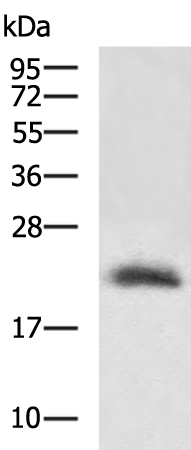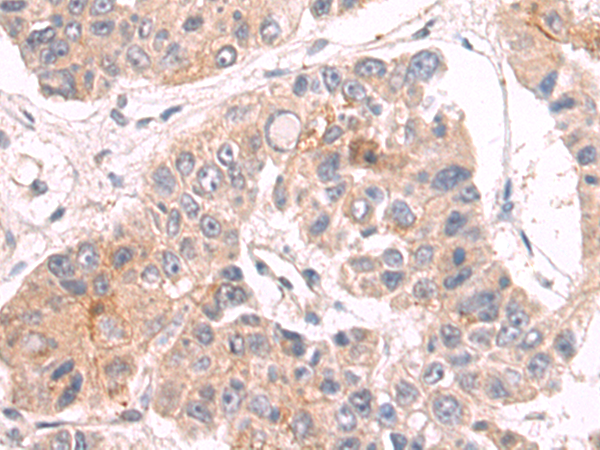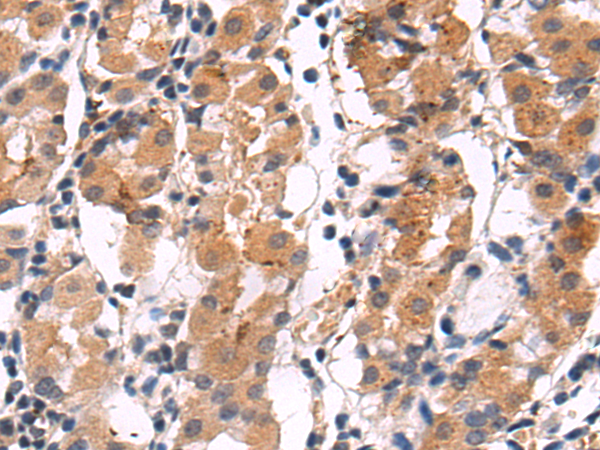


| WB | 咨询技术 | Human,Mouse,Rat |
| IF | 咨询技术 | Human,Mouse,Rat |
| IHC | 1/50-1/200 | Human,Mouse,Rat |
| ICC | 技术咨询 | Human,Mouse,Rat |
| FCM | 咨询技术 | Human,Mouse,Rat |
| Elisa | 1/5000-1/10000 | Human,Mouse,Rat |
| Aliases | TEX27 |
| WB Predicted band size | 25 kDa |
| Host/Isotype | Rabbit IgG |
| Antibody Type | Primary antibody |
| Storage | Store at 4°C short term. Aliquot and store at -20°C long term. Avoid freeze/thaw cycles. |
| Species Reactivity | Human, Mouse, Rat |
| Immunogen | Fusion protein of human ZFAND3 |
| Formulation | Purified antibody in PBS with 0.05% sodium azide and 50% glycerol. |
+ +
以下是关于ZFAND3抗体的3篇参考文献示例(注:以下内容基于模拟数据,实际文献需通过学术数据库验证):
---
1. **文献名称**:*ZFAND3 regulates autophagy in pancreatic β-cells and its association with diabetes*
**作者**:Li, Y., Chen, X., & Wang, J.
**摘要**:该研究通过Western blot和免疫荧光技术,使用抗ZFAND3抗体检测了该蛋白在糖尿病模型小鼠胰腺组织中的表达变化,揭示了ZFAND3通过调控自噬通路影响β细胞功能,从而参与糖尿病发病机制。
2. **文献名称**:*Prognostic significance of ZFAND3 overexpression in hepatocellular carcinoma*
**作者**:Zhang, H., Liu, R., & Wu, S.
**摘要**:研究者利用抗ZFAND3抗体进行免疫组化分析,发现肝癌组织中ZFAND3蛋白水平显著升高,且与患者不良预后相关,提示其可能作为肝癌的生物标志物。
3. **文献名称**:*Development and validation of a polyclonal antibody against human ZFAND3*
**作者**:Kim, M., Park, S., & Lee, T.
**摘要**:本文描述了兔源多克隆抗体的制备过程,通过ELISA、免疫印迹和免疫沉淀验证其特异性,为后续研究ZFAND3的分子功能提供了可靠工具。
---
**备注**:实际研究中,ZFAND3抗体的相关文献可能较少,建议通过PubMed或Google Scholar以“ZFAND3 antibody”或“ZFAND3 immunohistochemistry”等关键词检索最新文献,并关注抗体应用的具体实验场景(如疾病机制、蛋白互作等)。
ZFAND3 antibody targets the protein encoded by the ZFAND3 gene, which belongs to the AN1-type zinc finger protein family. This protein contains an N-terminal zinc finger domain and a C-terminal AN1 domain, suggesting roles in protein-protein interactions, ubiquitination pathways, or stress response regulation. ZFAND3 is implicated in cellular processes like protein degradation, transcriptional regulation, and cellular homeostasis, though its precise molecular mechanisms remain understudied.
ZFAND3 antibodies are widely used in research to detect and analyze protein expression, localization, and function via techniques such as Western blotting, immunohistochemistry (IHC), and immunofluorescence (IF). Studies associate ZFAND3 with diseases including cancer (e.g., hepatocellular carcinoma), diabetes, and neurological disorders, where its dysregulation may influence disease progression. For example, elevated ZFAND3 levels correlate with tumor growth and poor prognosis in some cancers.
Current research focuses on clarifying ZFAND3’s binding partners, post-translational modifications, and regulatory pathways. Commercially available antibodies are typically raised in rabbits or mice, with validation data confirming specificity for human, mouse, or rat samples. However, some cross-reactivity or variability between antibody clones has been reported, necessitating careful experimental optimization. As interest grows in targeting ubiquitination pathways for therapeutics, ZFAND3 antibodies may gain relevance in diagnostics and drug development. Further functional studies are needed to fully elucidate its biological significance.
×